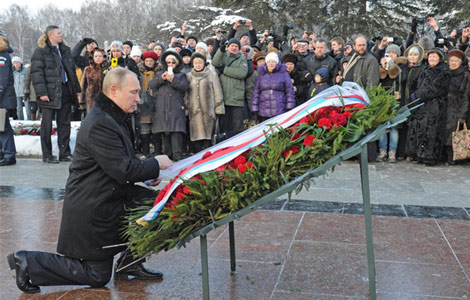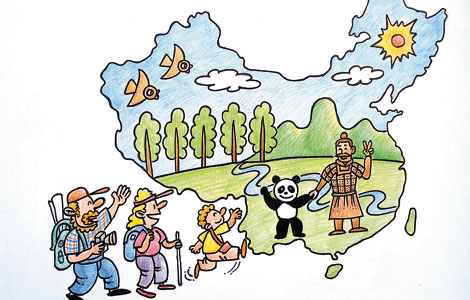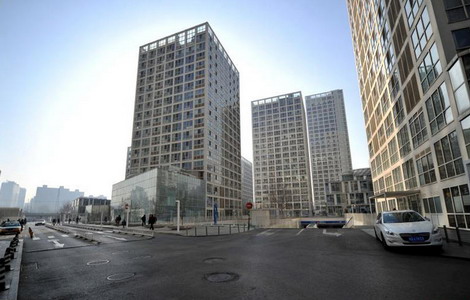Shue Haipei: Pushing for change at the highest levels
Updated: 2014-01-29 05:48
(China Daily)
|
||||||||
Back in his student days at the University of Wisconsin-Madison in the late 1980s and early 1990s, almost every evening between six and seven, Shue Haipei would religiously watch The MacNeil/Lehrer NewsHour to learn about current affairs and the "power English" spoken by the top personalities being interviewed. Shue would take notes and imitate the way they spoke.
Two decades later, Shue, who was born and raised in China, has become an activist in the US known for his advocacy skills and communication expertise in bridging Chinese communities and the US government.
"I have always been very keen on public advocacy," said Shue, now 53 and the president of the National Council of Chinese Americans (NCCA). "For the past 20 years, I have chosen a rather unique path, though a very difficult one."
Shue’s recent achievements include having successfully brought together Chinese communities in the US and lobbied Congress to pass a resolution apologizing for the abolished Chinese Exclusion Act in 2012.
The Chinese Exclusion Act, enacted in 1882, halted Chinese immigration and prohibited Chinese in the US from becoming citizens. It also denied Chinese Americans basic freedoms because of their race. The act was not repealed until 1943, when China became an ally of the US in World War II.
"One day I saw in the news that California apologized to the Chinese-American community, which made me think that the US should apologize on the national level too," said Shue, referring to an apology bill passed by the California legislature in 2009.
"My advantage is that I am familiar with the Congress. So after careful evaluation, I thought that although it would be a long shot, it was doable," said Shue, who then gathered his friends to discuss the feasibility of the goal.
"Everyone was so supportive that I had a gut feeling that it was possible to push it through," Shue said. "Once we had the conviction, the second step was coalition building."
Unlike most issues, asking for an apology over the act was not controversial among different Chinese communities, making it easier to reach consensus, according to Shue. The Chinese American Citizens Alliance and the Committee of 100 included, Shue was able to get more than 160 groups to sign the petition.
"I thought we had it until the Democrats lost the House to the Republicans (in 2010). For one, the relationship between Chinese Americans and the Democrat Party was very good," said Shue. "For another, the Speaker at the time, Nancy Pelosi, was from San Francisco, where a large percent of her constituents were Chinese. I was pretty sure she would have helped us."
Despite the minor bump in the road, Congress approved the apology bill in the end after Shue persuaded Republican leaders. But it was only a start for Shue.
"We will have an annual conference that features Chinese museums and other relevant groups in the US, not just to educate Americans about that chapter in their history, but also to coordinate communities of Chinese heritage," he said. "Secondly, we want to push for more high school textbooks to introduce and update the history of the act."
Back in early ’90s, Shue wrote an opinion piece on the US’ renewal of China’s Most Favored Nation (MFN) trade status and sent it to the Wall Street Journal.
"I was really a nobody, but the Wall Street Journal’s op-ed section actually posted my article, which changed my life thereafter," said Shue, who was invited to join business lobbies to push for China’s MFN status.
Starting from the mid 2000s, Shue began to help politicians reach out to Asian-American voters in their campaigns. The list of people he worked for includes current Secretary of State John Kerry, Senator Ben Cardin, Maryland Governor Martin O’Malley and then Senator Barack Obama.
"Back then most Chinese tended to support Hilary, but I went for Obama," Shue said. "About half a year before he announced his run for President, I met him in his office. I knew he was going places.
"Also he was working on a US-China working group, which showed that he took China very seriously," Shue said.
For years Shue had been polishing his English to aid his public advocacy efforts in the US. During the 2008 presidential campaign, he got a big break.
"As the Lunar New Year was approaching, I kept asking Obama’s core team to write greetings in order to reach out to potential Asian-American voters. But they were too busy," said Shue. "At the last minute, I decided to do it for him, and stayed up until four or five o’clock in the morning to get it done.
"As a Chinese I knew what would work. For example, the sentence 'I am one of you’ was frequently quoted by the media," said Shue. "I was glad that the professional speechwriters only edited six or seven words and we were faster than Hilary’s team."
While Shue’s accomplishments seem impressive, they have not brought much financial reward.
"Between making big money and pushing for change, I would easily choose the latter because that is my interest," said Shue.
Zhang Yang contributed to this story and can be reached at yangzhang@chinadailyusa.com.

 Putin pays tribute to Siege of Leningrad victims
Putin pays tribute to Siege of Leningrad victims
 Chinese ace Li Na before she was famous
Chinese ace Li Na before she was famous
 Xi visits soldiers on frozen northern border
Xi visits soldiers on frozen northern border
 Premier calls for action to relieve poverty
Premier calls for action to relieve poverty
 Tough Guy event in England
Tough Guy event in England
 Syria talks bring offer of exit from siege of Homs
Syria talks bring offer of exit from siege of Homs
 Anti-World Cup protests wane in Sao Paulo
Anti-World Cup protests wane in Sao Paulo
 India celebrates 65th Republic Day
India celebrates 65th Republic Day
Most Viewed
Editor's Picks

|

|

|

|

|

|
Today's Top News
Japan should learn from Germany: US expert
Bird flu prompts countermeasures
Hotline on way for Chinese abroad
Call made for special currency
South China Sea archives open in Hainan
Some good US advice for Japan on comfort women
US, UK in app-tapping scandal
Border control for H7N9 tightens
US Weekly

|

|







